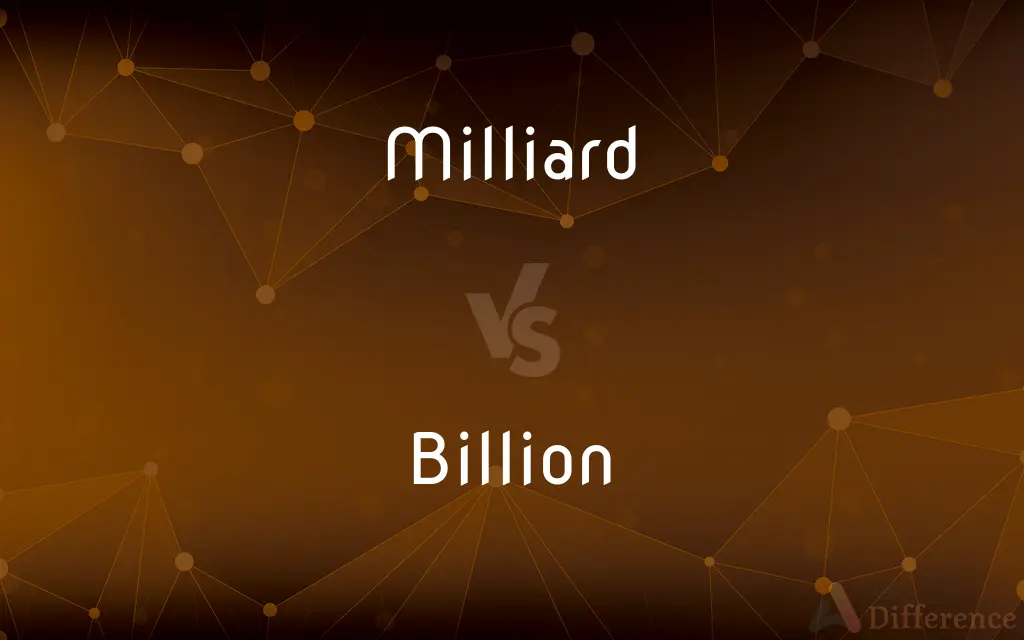Milliard vs. Billion — What's the Difference?
By Maham Liaqat & Fiza Rafique — Updated on March 7, 2024
Milliard refers to 10^9 in some European languages, while Billion in American English denotes the same.

Difference Between Milliard and Billion
Table of Contents
ADVERTISEMENT
Key Differences
Milliard is a term used predominantly in British English and other non-American English-speaking countries to represent the number 1,000,000,000 (10^9), serving as an intermediary between a million and a billion. On the other hand, in American English, the term "billion" directly signifies this number, bypassing the use of "milliard" altogether.
In the context of numerical systems, milliard comes from the long scale system where a billion equals 10^12, while billion in American English follows the short scale system where a billion is 10^9. This difference highlights the variance in numerical naming conventions across cultures.
The usage of milliard is decreasing, with more global adoption of the American English version "billion" for 10^9. Whereas, the term billion has become standard in financial and scientific contexts worldwide, indicating a shift towards uniformity in numerical expressions.
The concept of milliard is important in understanding historical financial documents or literature from regions that used the long scale system, while billion is universally recognized in contemporary discussions, emphasizing the evolution of language and its impact on numerical comprehension.
Financial systems, economics, and academia often require clear distinction between these terms to prevent misinterpretation, especially in international contexts where both systems might come into play. However, with the global dominance of the short scale system, the necessity to differentiate is diminishing over time.
ADVERTISEMENT
Comparison Chart
Numerical Value
10^9
10^9
Usage
Predominantly in non-American English-speaking countries
Standard in American English and increasingly worldwide
Scale System
Long scale
Short scale
Historical Usage
More common in the past
Has become the global standard
Contextual Importance
Important for historical and regional accuracy
Universally recognized in financial and scientific discussions
Compare with Definitions
Milliard
A numerical term used to represent 1,000,000,000.
The charity aimed to raise a milliard pennies for their cause.
Billion
A numerical term used in American English to represent 1,000,000,000.
The company's valuation reached a billion dollars.
Milliard
Increasingly replaced by the term billion in global discourse.
International reports now prefer 'billion' over 'milliard'.
Billion
Universally recognized in financial and scientific contexts.
The research grant was awarded a billion dollars.
Milliard
Commonly used in British English and other non-American contexts.
The British government announced a milliard-pound infrastructure project.
Billion
Adopts the short scale numbering system.
After a million, a billion is the next significant number in American English.
Milliard
Refers to the number following a million in the long scale system.
A milliard is significantly larger than a million.
Billion
Indicates a shift towards uniform numerical expressions worldwide.
Many countries now use 'billion' to denote 10^9.
Milliard
Important for understanding historical and regional numerical expressions.
Historical documents often mention expenses in milliards.
Billion
Essential for contemporary financial and academic discussions.
Modern economics books frequently discuss billion-dollar markets.
Milliard
The cardinal number equal to 109.
Billion
A billion is a number with two distinct definitions: 1,000,000,000, i.e. one thousand million, or 109 (ten to the ninth power), as defined on the short scale.
Milliard
109, a thousand (times a) million. (Now generally replaced by the short scale billion.)
Billion
The cardinal number equal to 109.
Milliard
A thousand millions; - usually called billion in the United States. See Billion.
Billion
Chiefly British The cardinal number equal to 1012.
Milliard
A billion;
In England they call one thousand million a milliard
Billion
An indefinitely large number.
Billion
A thousand million ([https://en.wikipedia.org/wiki/Long_and_short_scales#Comparison logic: 1,000 × 1,000^2]): 1 followed by nine zeros, 109; a milliard
Billion
A million million ([https://en.wikipedia.org/wiki/Long_and_short_scales#Comparison logic: 1,000,000^2]): a 1 followed by twelve zeros; 1012
Billion
An unspecified very large number.
There were billions of people at the concert.
Billion
According to the French and American method of numeration, a thousand millions, or 1,000,000,000; according to the English method, a million millions, or 1,000,000,000,000. See Numeration.
Billion
The number that is represented as a one followed by 12 zeros; in the United Kingdom the usage followed in the United States is frequently seen
Billion
The number that is represented as a one followed by 9 zeros
Billion
Denoting a quantity consisting of one thousand million items or units in the United States
Billion
Denoting a quantity consisting of one million million items or units in Great Britain
Common Curiosities
Which English-speaking countries primarily use the term billion?
Primarily, American English-speaking countries use the term "billion" for 10^9.
What numerical system does a milliard belong to?
A milliard belongs to the long scale numerical system.
What is a milliard?
A milliard represents the number 1,000,000,000 (10^9) in British English and other non-American English-speaking countries.
Why is the term milliard less commonly used now?
The term milliard is less used due to the global adoption of the American English term "billion" for 10^9.
Are there regions where milliard is still used over billion?
Some non-American English-speaking regions may still use "milliard" for clarity and tradition.
Has the global financial system adopted one term over the other?
The global financial system largely favors "billion" for 10^9.
How does a billion compare to a milliard in numerical value?
Both a milliard and a billion in American English represent 10^9.
How does historical context affect the understanding of milliard and billion?
Understanding the historical usage of these terms is essential for interpreting older documents accurately.
How does the scale system affect the interpretation of large numbers?
It influences how numerical values are understood and communicated across different languages.
Can the use of milliard vs. billion lead to misunderstandings?
Yes, especially in international contexts where different numerical systems may apply.
What impact does the shift from milliard to billion have on global communication?
It simplifies numerical communication and standardizes financial discussions.
Is there a difference in usage of milliard and billion between financial contexts?
Yes, "billion" is more universally accepted in financial contexts worldwide.
Do scientific and academic fields prefer one term over the other?
These fields increasingly prefer "billion" due to its universal understanding.
What is the future of the term milliard?
It is likely to become less common as "billion" becomes more universally adopted.
Why is it important to know the difference between milliard and billion?
For accurate interpretation of numerical values in different cultural and historical contexts.
Share Your Discovery

Previous Comparison
Devote vs. Dedicate
Next Comparison
Yeti vs. SasquatchAuthor Spotlight
Written by
Maham LiaqatCo-written by
Fiza RafiqueFiza Rafique is a skilled content writer at AskDifference.com, where she meticulously refines and enhances written pieces. Drawing from her vast editorial expertise, Fiza ensures clarity, accuracy, and precision in every article. Passionate about language, she continually seeks to elevate the quality of content for readers worldwide.
















































